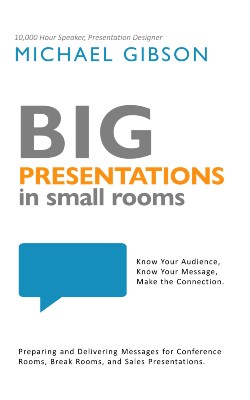Presentation Preparation: When it doesn’t happen
Big sigh.
Here we go again.
Another presenter is winging it.
Another panelist is hearing questions for the first time.
Another expert is relying on experience without thinking through how to communicate that experience with others.
The audience is frustrated because the presenter is not prepared.
Presentation Preparation is not a one-size-fits-all proposition. Your approach depends on the assignment.
Be determined to be prepared. Unless called on for an impromptu presentation, you have a responsibility to deliver presentations that have been prepared and practiced.
Know your hope. Know your presentation goal. And then prepare the content.
When assigned a presentation, there are two ways that you can know stuff:
you can know it from experience, or you can know it from research.

Presentation Preparation Based on Experience
Over the past decade, I have attended many conferences. Sometimes, event organizers sought to provide information from experienced people in a specific field. These panel discussions were often frustrating for the audience. Panelists would usually arrive with little (or no) presentation preparation. Perhaps organizers told them they would not need to prepare, that all they needed to do was get on stage and answer questions. Audience members could tell that panelists were hearing those questions for the first time. Speaking in front of hundreds of people, they were winging it. It was not good. There was no presentation preparation.
Being unprepared, the experts would share accurate information in confusing ways. After a few minutes, the audience became distracted. They were not engaged because the content was disorganized. It was accurate, but it was not helpful. The conference organizers could increase engagement by providing the questions ahead of time. It would be even better if panelists were required to submit answers ahead of time, requiring them to consider their responses and be better prepared when speaking to a live audience.
A similar thing can happen with small-room presentations. Some assignments focus on your experience. If asked to provide information regarding your daily work, you already know this stuff. You do not need to go and learn what your daily work involves.
For these presentations, your responsibility is to ensure content is understandable and well structured. Know your audience. If they are familiar with the terminology associated with your work, then you can use that language as you present. If some of the participants are unfamiliar with those terms, then slow down and ensure that effective communication occurs, that they will understand every word you say. If you fail in this, the alienated participants will be uncomfortable at the least and defensive at the most. Neither scenario is conducive to cooperation.
If asked to present information regarding daily work or areas of expertise, the temptation is to wing it because the content is familiar. If you do, there is a possibility the information will be trustworthy but difficult to understand. You might talk in circles or possibly speak over their heads. Presentation preparation is needed even when you are experienced in the topic area.

Presentation Preparation Based on Research
Other times, you might be asked to deliver content regarding new ideas or facts that are not part of your daily work. For example, you might be asked to report information regarding what a competitor is offering, or insights regarding their advertising approach. Your presentation will include data you have to go and find because it is not readily available to you.
If asked to present information regarding unfamiliar content, there will be homework! Presentation preparation is needed. First, locate trustworthy sources of information. This responsibility requires more than a general Google search. Dig deeper and find reliable sources. Be careful. If you do a poor job of compiling trustworthy information, it could become a source of embarrassment. It could also cause you to lose opportunities in the future. Be determined to bring information to the table that is both helpful and trustworthy.
Then the process becomes similar to the one involved with expertise. Take the trustworthy information and structure it so that the audience can easily understand it. Beware of confusing terminology, including industry insider language.
When the information is new to you, there is a need to internalize that information. Presentation preparation means familiarizing yourself with the content so that you can share it without having to read it from notes or from a slide.
When you must discover, compile, and prepare the information, it will be more work. Therefore, you need to set aside more time to get your stuff together.

Presentation Preparation with Proper Determination
Whether you know stuff from experience or you know stuff from research, the need for presentation preparation remains. The preparation will be different depending on the situation. Some scenarios require more work than others, but all scenarios should be addressed with a determination to provide trustworthy and easily understood information.
Want to know more? Keep reading?
Want to know even more? Get the book Big Presentations in Small Rooms or check out the podcast!
So…
What memories do you have regarding presentations where the presenter was experienced, but the thoughts were disorganized? What memories do you have regarding presentations where the presenter offered material based on incomplete or inaccurate research?




